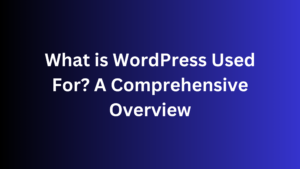Do you dream of creating exciting web apps on your own? Then, full-stack web development could be your perfect match. Full-stack developers work on both the front and back ends of websites.
They also handle databases, deployment to the cloud, and more.
To excel as a full-stack web developer, you need a broad skillset.
But what does it mean to be one? And how do you land the right job in this competitive market?
This article will explain the skills you need, the job outlook, and the career paths available.
Key Takeaways
- Full-stack web development is a highly sought-after and versatile career path that allows professionals to build dynamic web applications from the ground up.
- Full-stack developers possess a diverse skillset that encompasses front-end and back-end development, database management, cloud deployment, and more.
- The demand for full-stack web developers has been proliferating, driven by the increasing complexity of modern web applications and the need for versatile professionals.
- Full-stack developers can command competitive salaries, with the average annual salary ranging from $70,000 to over $120,000.
- To become successful full-stack developers, professionals must possess a diverse set of skills, including JavaScript frameworks, server-side scripting languages, and responsive design.
What is a Full Stack Web Developer?

A full-stack web developer is skilled in front-end and back-end web development. They can design and implement websites that look and function well.
They use languages like HTML, CSS, and Javascript for the look and feel. They use server-side logic and databases with languages like Node.js or PHP for functionality.
Front-end Development Responsibilities
These developers make web applications easy to use and look great.
They use HTML, CSS, and JavaScript to create interfaces that work smoothly on any device.
They also use tools like React or Angular to add dynamic features that improve user experience.
Back-end Programming Duties
In the back-end, developers create the hidden parts that make everything work.
This includes building APIs, connecting to databases, and managing user data.
They use languages such as Node.js or PHP to ensure the website’s back-end supports the front-end’s needs.
Full Stack Web Developer Skillset
Full-stack developers need to know a lot.
This includes front-end and back-end development, database management, and cloud deployment. They ensure that all parts of a website or application work well together from start to finish.
The Booming Demand for Full Stack Developers
The need for full-stack web developers is quickly getting larger.
This rise is because web applications are more complex.
Companies look for experts who know all the parts of making these apps. The job outlook for full-stack developers remains strong, and there are more opportunities in many fields.
According to the U.S. Bureau of Labor Statistics,
software developers, including web developers, will see a 13% job increase by 2029.
This growth is quicker than for most jobs. It’s because companies are using more web applications and want a solid online presence.
Full-stack developers work on both the parts seen by users and the hidden parts. They are critical as companies want to be more efficient and offer complete digital solutions.
So, their future job prospects look very bright.
There’s a high demand for full-stack pros in fields like e-commerce, retail, healthcare, and finance. They build robust web apps,
combine different technologies, and ensure users have good experiences. Full-stack developers are ready to do well in the changing field of web development because of their versatile skills.
Key Responsibilities of a Full Stack Web Developer
Full-stack web developers are vital to modern web development.
They take on many jobs, covering everything from making user interfaces to handling database systems. Their work helps create dynamic, safe, and scalable websites.
Web Application Development

Full-stack web developers focus on creating and managing web apps.
They design user interfaces using HTML, CSS, and JavaScript. Languages like React, Angular, and Vue.js help them with this.
They also work on server logic and APIs and connect to databases.
Tools like Node.js, PHP, or Python are used for this. This makes sure everything runs smoothly and manages data well.
Database Management
Managing the databases of web apps is a big part of their job.
They create and manage efficient database systems, which ensure that data is secure, works well, and is well-organized.
Tasks include creating tables, setting up relationships, and running queries. They ensure the app can store and retrieve data as needed.
Cloud Deployment and Hosting
Deploying and hosting apps in the cloud is a crucial skill.
Full-stack developers pick the right cloud services and handle setup. This makes apps scalable, safe, and always available.
They also manage web hosting, domains, and server upkeep, ensuring that the websites they build are reliable and easy to access.
Complete Stack Web Developer Jobs: Salary and Job Outlook
Full-stack web developers make a good living.
They earn from $70,000 to $120,000 a year, varying with location, experience, and industry. Their high salaries show how much their skills are needed in web development.
Average Salaries for Full Stack Developers
Software developers, including web developers, earned a median salary of $107,510 in 2020. But full-stack developers with more skills can make even more.
They might earn over $100,000. Pay depends on the company and the developer’s expertise.
Job Growth and Career Prospects
The future looks bright for full-stack developers.
Jobs are expected to grow by 13% from 2019 to 2029, faster than many other jobs. This growth is due to businesses focusing more on their websites and apps.
As digital efforts increase, so do opportunities for full-stack developers.
They can grow their careers across different fields. By learning new skills and keeping up with tech changes, these developers can enjoy a rewarding career in web development.
Top Skills for Becoming a Successful Full-Stack Developer
To be a top full-stack web developer, you need various skills. This includes being good at both front-end and back-end development. Some of the must-have skills are working withJavaScript frameworks
, server-side scripting languages
and making responsive designs
for devices and browsers.
JavaScript Frameworks (React, Angular, Vue.js)
Building the front end of web apps today often means using React,
Angular or Vue.js. Full-stack developers use these to make user-friendly and interactive sites. Knowing these JavaScript frameworks well lets developers make apps that users love.
Server-side Scripting Languages (Node.js, PHP, Python)
For the back-end,
Full-stack developers need to know server-side scripting languages like Node.js, PHP, and Python. These are vital for the app’s logic, APIs, and data work.
Being good at these server-side scripting languages helps make stable and safe back-end systems.
Responsive Design and Cross-Browser Compatibility
Full-stack devs also need to create responsive designs for all devices.
They should make sure their apps work well on various browsers. This is key for a great user experience.
Having strong skills in JavaScript frameworks,
server-side scripting, and responsive design is essential for full-stack developers. Staying up-to-date with tech and staying flexible are important to succeeding in web development.
Full Stack Web Developer Jobs: Finding the Right Opportunity
Working as a full-stack web developer opens many doors to finding exciting jobs.
You can search through job boards, connect with others in the field, or even take freelance or remote jobs. This field’s flexibility has grown a lot lately.
Job Boards and Networking
Sites like Indeed, LinkedIn, and Glassdoor list many full-stack web developer jobs.
They offer a simple way to find and apply for jobs. It’s also wise to connect with other developers, go to job fairs, and use your network for hidden job openings.
Freelancing and Remote Work
Remote work is becoming more common,
giving full-stack developers more options. Sites like Upwork, Fiverr, and Freelancer.com are perfect for showing what you can do and finding work.
What’s remarkable is that starting freelance can lead to a full-time remote job, offering work variety and a flexible lifestyle.
Building a Strong Portfolio and Resume
To stand out in the competitive market for full-stack web developers,
showcasing your skills and projects is vital. Your full stack web developer portfolio
should show off your top web projects. Talk about your work in both front-end and back-end development,
your management of databases, and using the cloud. Make sure to detail your role, the tech you used, and the impact of the project.
Showcasing Your Full Stack Projects

When showing your full stack web developer projects
, focus on your end-to-end development know-how. Display the web apps you’ve worked on. Go into the design, building, and launching phases.
Tell about the technologies you applied, like React or Node.js. Mention the hurdles you faced and how you dealt with them. Also, share the results of your work.
Highlighting Your Technical Skills
In your full stack web developer resume
, spotlight your mastery of various programming languages and tools.
Show you’re adept in front-end work, back-end development, managing databases,
and deploying on the cloud. Also, add certifications or awards that support your skills and understanding.
You can show employers you’re a critical player with a strong, clear portfolio and resume.
Continuous Learning and Professional Development
Full-stack web developers know that learning never stops.
The world of web development changes all the time.
New tools and practices come out often. That’s why it’s essential always to be learning and trying new things in web development.
Staying Up-to-Date with Web Technologies
It’s vital for full-stack developers to keep up with the latest tech.
They should look into new JavaScript frameworks and server-side languages.
Also, they need to know about cloud deployment methods. This helps them grow their skills and stay competitive.
Full-stack developers should regularly read blogs and follow leaders on social media.
Participating in online communities is also a great way to learn what’s new in web development.
Attending Conferences and Workshops
Going to conferences and workshops is very helpful. They offer chances to meet others and learn from the best.
At these events, full-stack developers can join hands-on workshops and learn from technical sessions. They can also take part in discussions.
This is how they learn new skills, generate new ideas, and keep up with what’s happening in web development.
| Continuous Learning Opportunities for Full Stack Web Developers | Benefits |
|---|---|
| Researching and experimenting with new web development tools and techniques | Expands skillset and keeps developers ahead of the curve |
| Attending industry conferences and workshops | Provides access to industry experts, networking, and hands-on learning |
| Participating in online communities and following thought leaders | Helps stay informed about the latest trends and best practices |
| Completing online courses and certifications | Enhances technical expertise and demonstrates commitment to professional development |
Interviewing for Full Stack Web Developer Roles
Applying for full-stack web developer jobs means showing off your skills and solving problems in interviews.
This might include coding tasks, talking about making web apps, and sharing why you make confident design choices.
Preparing for Technical Interviews
Good full-stack developers prepare well for interviews.
They know and can prove the latest tools and languages with coding and case studies. They also practice common interview questions and learn about the company’s tech stack.
Soft Skills and Cultural Fit
Besides tech skills, full-stack devs need strong soft skills, too.
This role values communication, teamwork, and readiness for change. It’s important to discuss how you solve problems, handle feedback, and love learning new things.
By preparing for both tech and soft skills in the interview, full-stack web developer candidates improve their chances of landing and excelling in their dream jobs.
Working as a Full Stack Developer: Collaboration and Problem-Solving
Working as a full-stack web developer means being part of a team.
You work with people like designers and back-end developers.
Communicating well and solving problems are must-haves. Also, knowing how to work in Agile methodologies is key to doing a great job.
Agile Methodologies and Project Management
Being good at your job means being able to break down what’s needed,
divide tasks, and work closely with others.
Full-stack developers use Agile methodologies like Scrum or Kanban to change when needed. It helps you work well in a team, collaborate, and make high-quality web apps bit by bit.
Effective Communication and Teamwork
To do well in a full-stack development environment,
you need to be good with people.
This includes giving good feedback and learning from others. Telling others about tech stuff simply and listening to what users want is also essential.
Working together to solve complex problems is how you make projects succeed.
Total Stack Development in Specific Industries
Full-stack web developers have a wide range of skills they can use in many industries.
Some top sectors include e-commerce and retail, healthcare, and finance.
Each sector has its own needs and challenges that full-stack developers can address.
E-commerce and Retail
The e-commerce and retail worlds change quickly. In these areas,
full-stack developers are key. They help build online shops and make sure the payment process is smooth.
They use their skills to make sites that look great and work well.
This gives customers a good experience when shopping online. It helps stores sell more and keep customers coming back.
Healthcare and Finance

The healthcare and finance fields are different because they deal with essential data.
Developers in these areas need extra care in their work. They create secure apps that keep data safe but are still easy to use.
With their front-end and back-end skills, they build systems that meet industry rules.
This makes them very important in creating reliable web tools for these particular sectors.
To do well in these sectors,
full stack developers need to know the unique things about each one. They can grow their careers by focusing on what e-commerce, retail, healthcare, and finance need.
They can become key players in these growing industries.
The Future of Full-Stack Web Development
Full-stack developers must keep up with new trends and tech to stay competitive.
Trends like using serverless setups, headless CMS, and focusing on mobile and progressive web apps are essential. These areas are shaping the future of full-stack development.
They make apps more flexible, more accessible to scale, and better for users.
Emerging Trends and Technologies
In the future, developers will rely on serverless tech for more efficient and scalable apps.
This tech eliminates the need for managing servers and lets apps respond to events in real time. The shift to headless content management systems also changes how sites manage content.
Developers need to be skilled in API use to handle this shift smoothly with their apps.
Mobile-first design and PWAs are becoming more important, too.
These trends make apps work smoothly, like native apps on phones.
Full-stack developers must excel at making apps that feel great on any device. This ensures users have a good time no matter their platform.
The Importance of Adaptability
In this fast-paced field, being adaptable is crucial.
Full-stack developers must always be ready to learn new things and try new tools. The web development industry changes quickly.
Those who can keep up and lead in these changes will do well in the long run.
Staying flexible and learning are what will set developers up for success. It’s not just about what you know now; it’s about being ready for what’s next in this constantly evolving field.
Conclusion
Full-stack web development is a top career choice right now. It lets professionals use many skills. Companies want to improve their online work, so they need developers who understand all website-making parts.
Developers can succeed by constantly learning and having a good portfolio. Being good at solving problems is key. This way, they can do well in any field, like online shops, health care, and finance.
The world of web development is constantly changing. New things like serverless architecture and better ways to manage content are coming.
Developers need to be open to learning new things and trying different tools to do well. Adapting and staying innovative helps them have a great career.
FAQ
What is a Full Stack Web Developer?
A full-stack web developer works on both the front and back ends of websites. They create user interfaces with HTML, CSS, and JavaScript. They also handle server-side logic and APIs and connect databases using tools like Node.js or PHP.
What are the critical responsibilities of a Full Stack Web Developer?
They are in charge of building and updating web applications, managing databases, and handling cloud deployment. This means they take care of the whole project, from designing to deploying.
What are the top skills required to become a successful Full Stack Developer?
Full-stack developers need to be great at JavaScript and have skills in React, Angular, or Vue.js. They must also know server-side scripting in Node.js, PHP, or Python. Understanding databases, cloud deployment, and software principles is also crucial.
What is the job outlook and salary potential for Full Stack Developers?
The need for full-stack developers is growing fast. The U.S. Bureau of Labor Statistics predicts a 13% job jump between 2019 and 2029. Salaries range from $70,000 to over $120,000 annually.
How can I find the right Full Stack Web Developer job opportunity?
Check job boards like Indeed, LinkedIn, and Glassdoor to find jobs. Networking with other developers and attending industry events helps, too. Remote work makes freelancing or contracting more common.
What should I focus on to build a strong portfolio and resume as a Full Stack Developer?
To showcase your skills, create a portfolio with your best web projects. On your resume, mention specific tools and languages. Include any certifications or achievements that highlight your expertise.
How can I stay ahead of the curve in the ever-evolving Full Stack Development field?
Keep learning by staying up-to-date with new tools and techniques. Attend conferences and workshops, or take online courses. These steps help broaden your knowledge and stay connected in the field.




